Features
WHITHER IRAN'S DEMOCRATIC OPPOSITION?
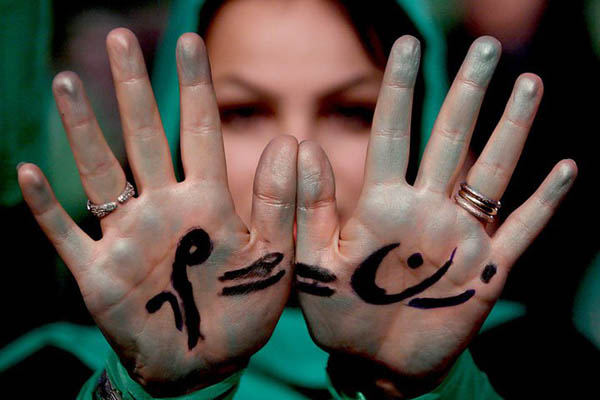 by Frieda Afary, Iranian Progressives in Translation
by Frieda Afary, Iranian Progressives in Translation
As we approach the June 2013 Iranian presidential election, the real front-runners of the 2009 election, Mir-Hossein Mousavi and Mehdi Karroubi, as well as Mousavi's wife, Zahra Rahnavard—all of whom came to be known as the leaders of the reformist Green movement—continue to languish under house arrest. Many young opposition activists, feminists, and ethnic activists who participated in protests against election fraud in 2009, or any activities deemed "seditious" by the regime, are also in prison.
Although the recent disqualification of two candidates, Akbar Hashemi Rafsanjani and Esfandiar Rahim Mashaei, from the election, is very significant and further reveals the intense power struggles within the regime, more significant are the defining issues which continue to fuel the grassroots discontent inside Iran. These issues are the following:
VIOLENCE AND IMPUNITY IN XALAPA
One Year after the Murder of Journalist Regina Martínez
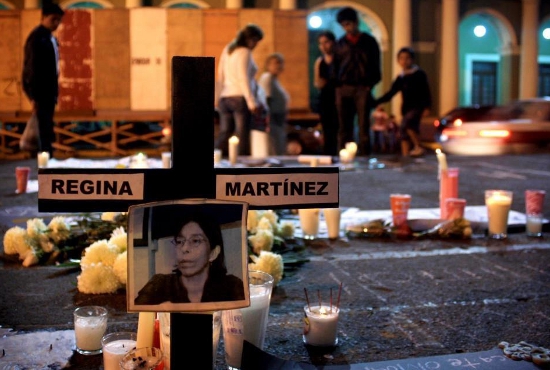
by Andalusia Knoll, Upside Down World
On April 28, 2012 journalist Regina Martínez was found strangled in the bathroom of her home in Xalapa, the capital of the southern Mexican state of Veracruz. Martínez was a renowned journalist with the Mexican weekly magazine Proceso, which for the past 36 years has been publishing articles about narco-trafficking, the war on drugs, and government corruption, among other topics. While Martínez reported frequently on all of these aforementioned topics, the Veracruzan government negated the fact that she was killed for her publications, instead attributing her murder to a common robbery.
Her assassination and the impunity surrounding it has become an emblematic case in the crisis suffered by journalists in Mexico. Over the last decade, Mexico has become one of the most dangerous countries for journalists, with increasing assassinations, forced disappearances, and physical threats against members of the media. According to press freedom group Article 19, threats against journalists in Mexico rose 20 percent from 2011 to 2012. Meanwhile, in the four months since president Enrique Peña-Nieto has taken power, the number of threats has risen another 20 percent. The Committee for Protection of Journalists has classified Mexico as the eighth worst country in the world for journalists in its annual Impunity Index.
U.S. STILL SUPPORTS HONDURAN DEATH SQUADS
by Lauren Carasik, Jurist
Honduras is plagued by the world's highest homicide rate. This has been widely reported for the past two years, yet the number of deaths has continued to climb. The UN put the number of homicides in 2011 at 91 per 100,000. The rate has spiked since the illegal coup d'état that ousted the country's democratically elected president in 2009 and the subsequent breakdown of Honduras' institutions; in 2008 the homicide rate was 61 per 100,000.
A climate of impunity solidified as the generals and others who carried out the coup were rewarded with appointments in the post-coup government rather than prosecuted for their role in the overthrow.
Contrary to what is often suggested in the press, the violence is not just random or drug- or gang-related; some of the most vulnerable sectors in society are frequent targets — those whose rights the US Department of State tells us it considers to be a high priority—women, the LGBT community, journalists, opposition party politicians and Hondurans who opposed the coup. Twenty-five journalists have been murdered in Honduras since the 2009 coup; all but one of them since the current post-coup president, Pepe Lobo, took office in January 2010. At least 53 lawyers were killed between 2010 and 2012.
'GOING EXTINCT IS GENOCIDE'
Lakota Elders Tour to Raise Awareness About Struggle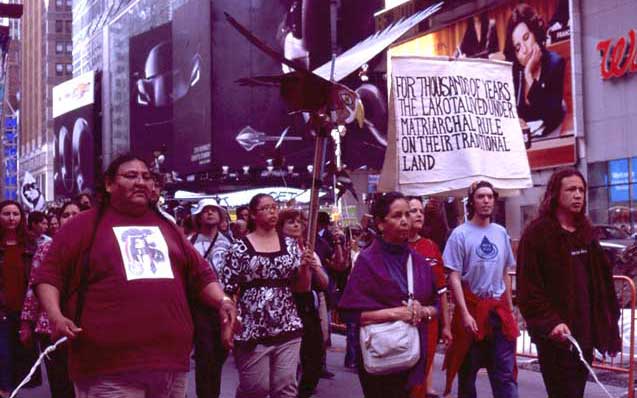
by Victoria Law, Truthout
NEW YORK — On April 9, Lakota elders, activists and nonindigenous supporters marched through the streets of Manhattan to the United Nations, where they attempted to present a petition to UN Secretary General Ban Ki-Moon. Entitled the Official Lakota Oyate Complaint of Genocide Based on the 1948 Convention on the Prevention and Punishment of the Crime of Genocide, the petition listed the numerous injustices faced by the Lakota people. (Oyate is a Sioux word for "people" or "nation.")
At the UN, security officers informed them that they would not be able to enter the building and present the complaint to the Secretary General. Instead, the security officers offered to take it to Ban's office, but refused to give the Lakota documentation verifying that their complaint had been received.
Outside the UN, Charmaine White Face, a Lakota grandmother and great-grandmother, addressed the 60 people who had marched with her. "We come here as a nation. If they won't let us take our message to them, how disrespectful is that to a nation?"
WHY RUSSELL 'MAROON' SHOATZ MUST BE RELEASED FROM SOLITARY CONFINEMENT
An interview with Theresa Shoatz and Matt Meyer
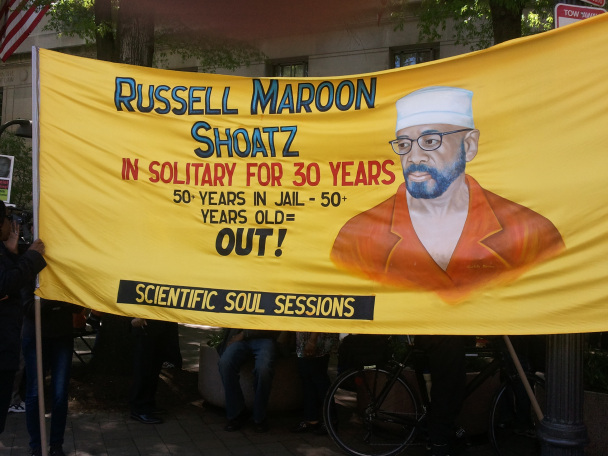
by Angola 3 News
This month, a 30-day action campaign was launched demanding the release of Russell "Maroon" Shoatz from solitary confinement, where he has been held for over 23 consecutive years—and 28 of the last 30 years in Pennsylvania prisons. On April 8, when the campaign began, Maroon's legal team sent a letter to the Pennsylvania Department of Corrections (PA DoC), demanding his release from solitary confinement and promising litigation against the PA DoC if he is not transferred to general population by May 8.
The action campaign describes Maroon as "a former leader of the Black Panthers and the Black freedom movement, born in Philadelphia in 1943 and originally imprisoned in January 1972 for actions relating to his political involvement. With an extraordinary thirty-plus years spent in solitary confinement… Maroon's case is one of the most shocking examples of US torture of political prisoners, and one of the most egregious examples of human rights violations regarding prison conditions anywhere in the world. His 'Maroon' nickname is, in part, due to his continued resistance—which twice led him to escape confinement; it is also based on his continued clear analysis, including recent writings on ecology and matriarchy."
Writing that Maroon "has not had a serious rule violation for more than two decades," the campaign argues that he has actually been "targeted because of his work as an educator and because of his political ideas; his time in solitary began just after he was elected president of an officially-sanctioned prison-based support group. This targeting is in violation of his basic human and constitutional rights."
LOOKING FOR GANDHIS IN MEXICO
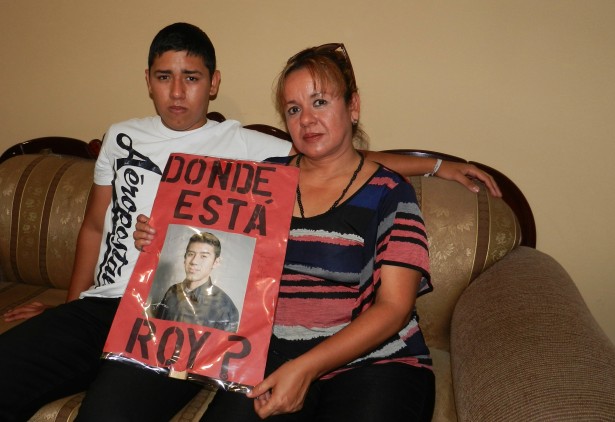
by Jens Erik Gould, Waging Nonviolence
New president, new ministers, new strategies. Same bloodshed. It has never been more obvious that the current approach to reducing Mexico's drug-related violence does not work.
Many of the Mexicans who voted for President Enrique Peña Nieto last year hoped he would fulfill his campaign promise to slow the carnage that has killed tens of thousands of people over the past six years. Not long after he took power, though, gunmen gang-raped six female tourists from Spain, more than a dozen members of a popular band were found dead and a police chief in a border city disappeared. Last month, a shooting killed seven people at a Cancún bar and two federal police officers were fatally shot on the border in Ciudad Juárez.
CURVARADO HUMANITARIAN ZONE
Colombian Communities Reclaim Land and Life
from the Paramilitary-Business Alliance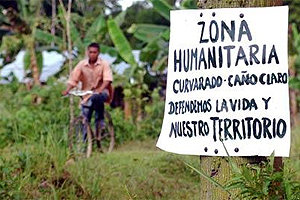
by James Bargent, Toward Freedom
The first of the displaced people to return to their homes in Curvarado, north Colombia found the forests they had known cut down, the rivers and streams diverted and the native wildlife long gone. It was a desert, they say—not of sand but of African-palm and cattle ranches.
Standing in the shadows behind the palm businesses and ranchers that had taken over the region were the same paramilitaries that had forced them from their homes several years before.
But still the people came. They built new communities known as "Humanitarian Zones," which are now legally recognized as neutral zones where all armed actors, legal and illegal are prohibited from entering. They also began the process of reclaiming the land exhausted by the agri-business onslaught, dividing recovered territory into "Biodiversity Zones."
PALESTINIANS AND THE SYRIAN REVOLUTION
Lessons from the Fight against Fascism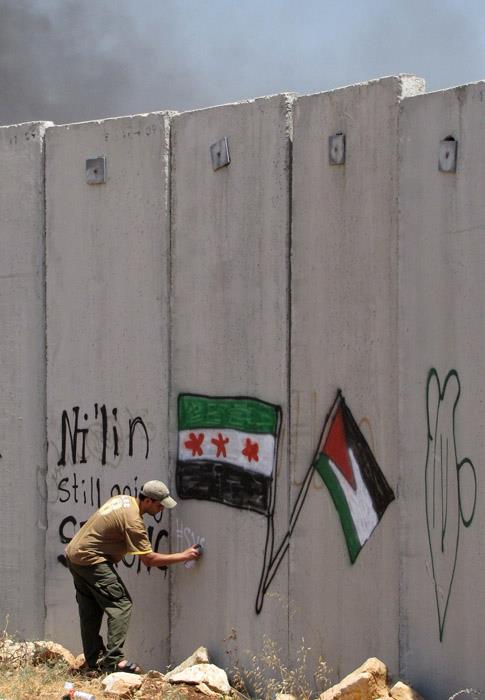
by Talal Alyan, +972 Magazine
The lapse of support for the Syrian revolution amongst some segments of the Arab left will in retrospect be regarded as another failure to stray from party vanguards. Palestinians have once again found themselves being used as props for political causes they neither endorse nor hold any sympathy for. The latest instance being the pro-Assad camp that has worked tirelessly to link the Palestinian issue with the Assad regime.















Recent Updates
1 day 5 hours ago
4 days 6 hours ago
4 days 6 hours ago
4 days 11 hours ago
4 days 11 hours ago
5 days 4 hours ago
5 days 4 hours ago
6 days 13 hours ago
1 week 4 hours ago
1 week 5 hours ago